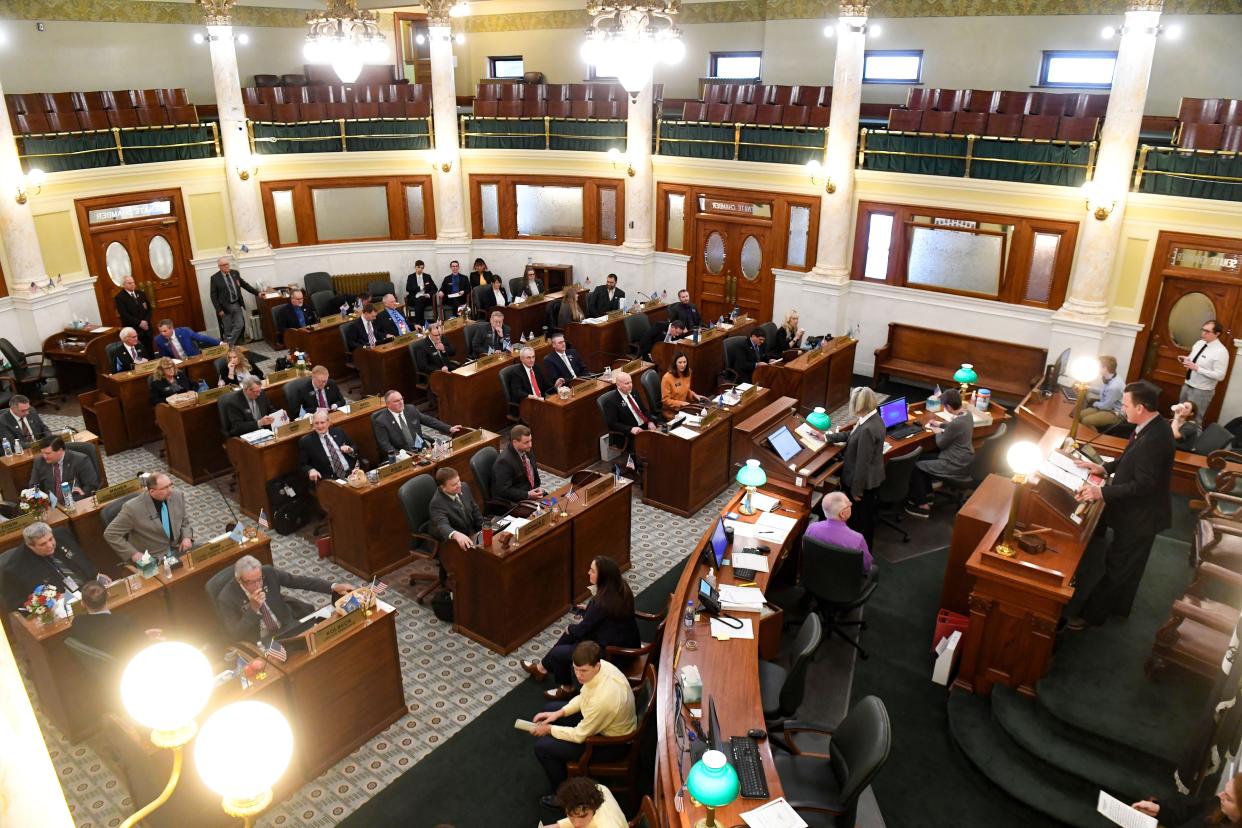South Dakota house committee kills three tax cut bills

- Oops!Something went wrong.Please try again later.
- Oops!Something went wrong.Please try again later.
PIERRE – The House Committee on Appropriations killed three of the tax cut bills introduced to the Legislature this session.
The bills included one that would exempt feminine hygiene products, such as tampons, from the state sales tax; one that would exempt burial and cremation services from the state sales tax; and one that would cut the food sales tax to 2.5%.
During a Wednesday morning hearing at the Capitol, each of the bills was deferred to the 41st day of the 38-day legislative session. The move basically defeats the bills but allows for a potential to revive them if there is enough interest among legislators.
Three other tax cut bills remain on the House Appropriations docket and are planned to be discussed on Feb. 21: a food sales tax repeal backed by Gov. Kristi Noem, a property tax reduction, and an overall sales and use tax reduction.
Feminine hygiene tax called ‘discriminatory’
South Dakota is one of 22 states with a sales tax on feminine hygiene products.
HB 1159, introduced by Rep. Erin Healy, D-Sioux Falls, would cost the state between $1 million and $3.6 million, based on estimates from the Bureau of Finance and Management and the Legislative Research Council, respectively.
Proponents argued it’s a public health issue, since people who can’t afford to buy tampons, pads or menstrual cups can get infections if they use unsanitary rags, napkins or toilet paper, or if they use a feminine hygiene product for longer than is safe.
Suzanne Herman with the advocacy group Period Law told legislators that the product is a medical need, adding that prescription drugs are excluded from state sales tax in South Dakota. She also noted that Viagra, an over-the-counter drug to treat erectile dysfunction, is exempt from tax. The Presentation Sisters of Aberdeen also testified in support.
Healy argued that the sales tax on feminine hygiene products is “discriminatory” because only people who menstruate have to buy the product.
“We all want taxes to be fair,” Healy told legislators. “Only by your gender are you getting taxed for these products. It’s inescapable.”
One opponent, Nathan Sanderson with the South Dakota Retailers Association, argued that if feminine hygiene products were exempt, then other personal hygiene products like toothpaste or toilet paper would have to be considered as well. The Bureau of Finance and Management also opposed the bill.
Rep. Linda Duba, D-Sioux Falls, made a motion to pass the bill onto the House floor for further debate, but when she waited for a second, there wasn’t one.
“Of course there isn’t,” Duba said. “There are eight other men in this room.”
Ultimately, the committee voted 8-1 to defer the bill to the 41st day.
Food tax compromise bill fails
HB 1095, introduced by Rep. Oren Lesmeister, D-Parade, would cut the 4.5% state food sales tax to 2.5%. Lesmeister said he introduced the bill as a potential compromise to the Gov. Kristi Noem-backed food tax repeal.
Opponents included Sanderson and the Bureau of Finance and Management. The Presentation Sisters of Aberdeen and Sen. Reynold Nesiba, D-Sioux Falls, spoke in support of the bill.
Gov. Noem’s bill will be heard in the committee on Feb. 21. Some legislators have said they can amend Noem’s bill if they don’t want to completely eliminate the food sales tax, rather than adopting bills like Lesmeister’s.
‘Death tax’ costs up to $300 for burials, cremations
HB 1197, introduced by Rep. Rebecca Reimer, R-Chamberlain, would exempt funeral, cremation and burial services from the state sales tax.
Under state law, the deceased must be cremated or embalmed and buried. With that law, families pay up to $300 in taxes for burials or cremations, Reimer said.
The bill would cost the state up to $3 million a year, according to an estimate from the Legislative Research Council. The tax exemption would not apply to tangible purchases, such as urns.
Opponents including Sanderson and the state Department of Revenue argued the tax would erode the state’s tax base.
“When you start to pick and choose exemptions, where do you start and stop?” Sanderson said.
This article originally appeared on Sioux Falls Argus Leader: South Dakota house committee kills three tax cut bills

